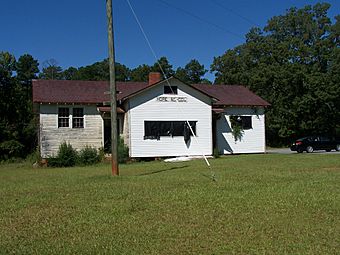Hope Rosenwald School facts for kids
Quick facts for kids |
|
|
Hope Rosenwald School
|
|

Hope Rosenwald School in 2006
|
|
| Location | 1971 Hope Station Rd. |
|---|---|
| Nearest city | Pomaria, South Carolina |
| Area | 2 acres (0.81 ha) |
| Built | 1925-1926 |
| Architect | Fletcher B. Dresslar Samuel L. Smith |
| Architectural style | Colonial Revival |
| NRHP reference No. | 07001045 |
| Added to NRHP | October 3, 2007 |
The Hope Rosenwald School, also known as Hope School, was a special school near Pomaria, South Carolina. It was built to help African-American children in rural areas get a good education during the early 1900s. This school is an important part of history and was added to the National Register of Historic Places in 2007.
Contents
History of Hope School
Building the School
In 1925, James Haskell Hope helped make this school possible. He was the Superintendent of Education for South Carolina. Mr. Hope sold over two acres of his land for a very low price. He sold it for just $5 to the local school district.
People worked together to raise money for the school. They collected $2,200 in donations. African Americans gave $600, and white Americans gave $400. The state and local governments added $1,200.
The Rosenwald Fund
A special group called the Rosenwald Fund also helped. This fund was created by Julius Rosenwald, who was the head of Sears, Roebuck and Company. He wanted to help build schools for African-American children in the Southern United States. The Rosenwald Fund gave $700 to build Hope School.
School Design and Life
The Hope School building followed a simple design. It was called the Rosenwald Two-Teacher Community School, Floor Plan No. 20. The school had a wooden frame and a strong brick foundation. Its roof was made of corrugated metal. The design also included some features of Colonial Revival architecture.
The school was located next to St. Paul AME Church. Two teachers worked at the school. One teacher taught students in the first, second, and third grades. The other teacher taught the fourth, fifth, and sixth grades.
School Closure and Legacy
Hope School closed in 1954. This happened when public schools in the area were combined. Even in 2007, some people who had attended the school still lived nearby.
Some items from the school are now in a museum. Desks, a wood-burning stove, and a school sign are kept at the National Museum of African American History and Culture. This helps people remember the school's history.
Hope School Community Center, Inc.
In 2005, the Hope School became a non-profit organization. It is now called "Hope School Community Center, Inc." This group works to help the community. They create programs that improve life for local residents. Their goal is to meet the needs of people in the area.
 | Mary Eliza Mahoney |
 | Susie King Taylor |
 | Ida Gray |
 | Eliza Ann Grier |



